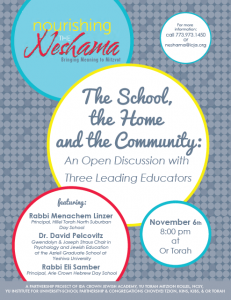RavMosheWeinberger.com has is offering a free shiur for a limited time. I have heard half of it alreay and it’s amazing and, even more than usual, Rav Weinberger cuts to the heart of the matter on several topics in a clear and emesdik way. The following was sent in an email:
Rav Weinberger – Almost Completely “Unfiltered!”
If you are ready to hear the truth, read on. And if you never, ever get another shiur (Heaven forbid!) or have never downloaded a shiur from this site, then this is the one to get – and it’s FREE!
The sparks were flying (literally, if you consider the nitzotzos of our neshamos) this past erev Shabbos during the Rav Kook shiur The Short Long Way and The Long Short Way, Especially In A Filtered World. Rav Weinberger used a Rav Kook essay that was not included in Oros HaTorah, to teach that there is a “short long” way and a “long short” way to reach a goal.
The “short long” way consists of shortcuts and superficial methodologies to quickly deal with the issue at hand. For example – I have been diagnosed with tennis elbow. It hurts and prevents me from lifting heavy objects due to the pain. The “short long” path (which I have taken for the past two months) is to take pain killers. This reduces the pain and allows my arm to function almost completely normally. However, the pain killers, while addressing the symptom, don’t solve the underlying problem.
The “long short” way (started last week) means adjusting the way I grip my power tools and bicycle handle bars, wearing an arm strap, some physical therapy and icing the muscle and elbow area frequently. While this path will likely take longer, it addresses the cause of the symptom.
Back to the shiur…after a only a few minutes Rebbi began talking (“talking” is really much too tame a term, but I was not able to find a nice synonym for “yelling”) about filtering the Internet, filtering girls, in fact, filtering out the entire world; he mentioned the events of a few months ago in Ramat Beit Shemesh, addressed teenager inter-gender relationships and trying to maintain shalom bayis by merely buying your spouse some flowers on erev Shabbos.
This is not how we become Jews who “know” Hashem and each other. We will not become closer to Him if our teachers, parents [and leaders] intimidate us and threaten us with gehinnom. Rebbi advocates that we must teach our children, beginning with first grade in the right, loving way and connect them by example to the Ribbonoh shel Olam. That is the path.
A very close friend commented about the shiur: “I love Rebbi the way he is now, but this is the Rebbi I fell in love with.”
OK. I got it off my chest – but really… this is a MUST HEAR shiur. Tell your friends, and family members… remember, it’s free!
Have a good Shabbos.
Moshe C.
P.S. You do know about our $6.99 for FIFTY shiurim monthly plan, right?









